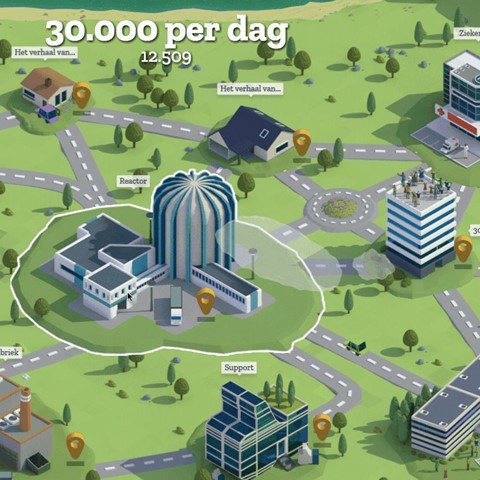NRG starts production of medical isotopes using only low-enriched uranium
Curium and NRG start production of new medical isotopes
30 April 2019
PETTEN – Alongside its partner company Curium, Petten-based NRG is the first facility in Europe to stop using high-enriched uranium in the production of medical isotopes. Only low-enriched uranium will now be used in the production of Molybdenum, an important isotope used in hospitals. As such, the Netherlands is honouring the commitments made to American president Obama.
As part of the non-proliferation agreement, a global consensus was reached on phasing out the use of high-enriched uranium, as this can be used to produce nuclear weapons. During the nuclear summit in The Hague in 2014, American president Barack Obama concluded deals with France, Belgium and the Netherlands to switch from high-enriched uranium to low-enriched uranium in the production of medical isotopes.
Contact NRG

Alex Rood
Account Manager
“We are playing a pioneering role and sending an important message to all other countries: you no longer need high-enriched uranium for the production of medical isotopes.“
More than 30.000 patients
Every day, 30.000 patients benefit from medical isotopes from Petten. The NRG reactor, where the targets for the production of these isotopes are irradiated, changed its fuel to low-enriched uranium in 2006. Here too, the Netherlands was leading the way at the time. In order to achieve the same for the production of medical isotopes, NRG and Curium had to modify the production process and a long and complicated route had to be followed to guarantee the same quality of the final product. NRG considers its success in this to be a major milestone.
“Together with Curium, we are playing a pioneering role and sending an important message to all the other countries. And that is that you no longer need high-enriched uranium for the production of medical isotopes,” says Philippe Brouwers, Business Director at NRG. “In a way, it’s like having a Fairtrade certification for medical isotopes, but then from a non-proliferation perspective. We are happy that this allows us to fulfil the promises made during the nuclear summit.”
At the end of last year, NRG launched the campaign 30.000 per day, to emphasise the importance of medical isotopes in the detection and treatment of cancer. According to Brouwers, the switch to low-enriched uranium is crucial to securing the supply of Molybdenum in the long term.
Molybdenum is used 40 million times a year worldwide in diagnostic tests in hospitals, for example in oncology, cardiology and neurology. During such tests, patients are injected with a mildly radioactive liquid. NRG is the world’s leading producer of targets for Mo-99 production.
Molybdenum is produced by its partner company Curium, using only low-enriched uranium in the reactor in Petten. Before 2018, the irradiated material consisted of high-enriched uranium. Curium supplies molybdenum to hospitals all over the world.

More information?
Do you wish to learn more on developing medical isotopes and how FIELD-LAB can help you? Get in touch with us!

